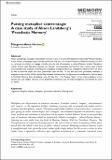Files in this item
Putting metaphor centre stage : a case study of Alison Landsberg's 'Prosthetic Memory'
Item metadata
| dc.contributor.author | Hutton, Margaret-Anne | |
| dc.date.accessioned | 2021-08-17T12:30:13Z | |
| dc.date.available | 2021-08-17T12:30:13Z | |
| dc.date.issued | 2021-08-05 | |
| dc.identifier | 274712485 | |
| dc.identifier | 66a1456e-407b-4c04-b146-30f72b94c2fa | |
| dc.identifier | 000683942400001 | |
| dc.identifier | 85112142779 | |
| dc.identifier.citation | Hutton , M-A 2021 , ' Putting metaphor centre stage : a case study of Alison Landsberg's 'Prosthetic Memory' ' , Memory Studies , vol. OnlineFirst . https://doi.org/10.1177/17506980211037279 | en |
| dc.identifier.issn | 1750-6980 | |
| dc.identifier.uri | https://hdl.handle.net/10023/23787 | |
| dc.description.abstract | Alison Landsberg’s concept of ‘prosthetic memory’ is one in a series of metaphors adopted by Memory Studies. In this article Landsberg’s tropic concept serves not only as a case study in relation to Memory Studies, but also as a prompt to scholars to engage critically with the use of metaphor in cultural / literary studies. Metaphors matter. Poorly used figurative language can hamper communication and restrict how a given topic is both circumscribed and analysed. According to conceptual metaphor theorists, metaphors influence how we think as well as how we speak, and thus, potentially, how we live. To this end the term ‘prosthetic memory’ is analysed in the context of the relationship between the literal and the figurative as manifested at various levels in Prosthetic Memory, from Landsberg’s use of a key film—The Thieving Hand—in her theory-building, to her stylistic tics and sleights of hand, to her probably unconscious use of verbal metaphors (considered by some as ‘dead’) | |
| dc.format.extent | 13 | |
| dc.format.extent | 151048 | |
| dc.language.iso | eng | |
| dc.relation.ispartof | Memory Studies | en |
| dc.subject | Cognitive metaphor theory | en |
| dc.subject | Metaphor | en |
| dc.subject | Prosthetic memory | en |
| dc.subject | Thieving Hand | en |
| dc.subject | N Visual arts (General) For photography, see TR | en |
| dc.subject | P Language and Literature | en |
| dc.subject | T-NDAS | en |
| dc.subject.lcc | N1 | en |
| dc.subject.lcc | P | en |
| dc.title | Putting metaphor centre stage : a case study of Alison Landsberg's 'Prosthetic Memory' | en |
| dc.type | Journal article | en |
| dc.contributor.institution | University of St Andrews. School of Modern Languages | en |
| dc.identifier.doi | https://doi.org/10.1177/17506980211037279 | |
| dc.description.status | Peer reviewed | en |
This item appears in the following Collection(s)
Items in the St Andrews Research Repository are protected by copyright, with all rights reserved, unless otherwise indicated.

